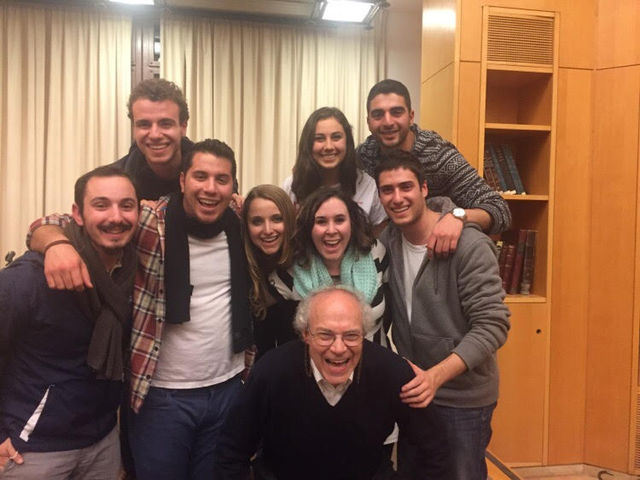“The Shalom Hartman Institute is a pluralistic center of research and education deepening and elevating the quality of Jewish life in Israel and around the world. Through our work, we are redefining the conversation about Judaism in modernity, religious pluralism, Israeli democracy, Israel and world Jewry, and the relationship with other faith communities.”
The Institute runs programs out of their campus in Jerusalem as well as throughout North America. Such programs include “Hevruta,” their innovative gap year program that brings American and Israeli teens together to study, as well as week-long seminars in the U.S. and in Israel for American clergy members, lay leaders, and recently even American Muslim leaders. Most recently, the Institute brought together students from eight American college campuses, including eight UCLA students and our fearless leader, Director Emeritus of Hillel at UCLA, Rabbi Chaim Seidler-Feller, for a week-long trip. The iEngage program, which Rabbi Chaim helped create, is meant to frame the conversation of the Israeli-Palestinian conflict in a “values discourse” through the Institute’s progressive Beit Midrash model.
There are few institutions, UCLA being one of them, that can boast faculty as highly regarded as those of the Hartman Institute. Fellows and staff of the program span the spectrum of religion, culture, and politics, and include Israeli peace negotiator Tal Becker, renowned author Yossi Klein Halevi, and former Knesset member Ruth Calderon — all of whom brought their own unique and robust opinions on the Israeli-Palestinian conflict to a conversation where differing narratives were welcome and present. When Becker lectured on compromise, for instance, he not only used Talmudic sources but also anecdotes from the negotiation room, sharing stories of interactions with world leaders like President George W. Bush and former Secretary of State Condoleezza Rice.
The goal of our conversation was to present the differing narratives that exist in Israel regarding everything surrounding the Palestinian people, two-state solutions, and a multitude of other security topics. By introducing the complex web of Israeli and Palestinian narratives, the Hartman Institute hoped to help reinvest American Jews, specifically college students, in a topic that, since 1948, has been one of the largest aspects of American Jewish identity: Israel.
Hartman’s iEngage based its curriculum on a set of values, and the personal organization of those values gave each person what President of the Shalom Hartman Institute of North America Dr. Yehuda Kurtzer describes as their “Israel Cocktail,” someone’s unique view on Israel. By recognizing that each person in the Israel conversation is rooted in the same core values, no one perspective is deemed any less or more legitimate than the other. The five values the Institute presented — self-preservation, justice, compromise, the land of Israel, and exceptionalism — were the focus of each discussion. In fact, the speaker used both traditional and modern Jewish texts to frame these values as core Jewish values allowing the Israeli-Palestinian conversation to be one that is interconnected to our American Jewish identities. According to Becker, by understanding how someone weighs these five values, you can not only understand his or her political opinion, but more often than not, you can accurately deduce someone’s political stance.
Below, in alphabetical order, are the five values along with Jewish sources the Shalom Hartman Institute provided to create your own “Israel cocktail.” Take your time thinking about how you would personally order these and the role they play in your own opinion on Israel.
Justice: Deuteronomy 16:20, Genesis 9:1-6, Babylonian Talmud Tracte Shabbat 31, Leviticus 19:18, Deuteronomy 22:1-4, Babylonian Talmud Tractate Gittin 55a
Compromise: Tosefta Sanhedrin 1, Midrash Aggadah Parshat Chukat Ch.2, Baylonian Talmud Tractate Eruvin 13b, Babylonian Talmud Tractate Hagigah 3b, Genesis Rabbah 8:5, Babylonian Talmud Tractate Shabbat 119a
Self-preservation: Genesis 1:26-28, Genesis 9:1-6, Leviticus 19:18, Babylonian Talmud Tractate Baba Metzia 62a, Babylonian Talmud Tactate Sanhedrin 74a, IDF Spirit: Purity of Arms and the Code of Morality in War, Emil Fackenheim’s “The 614th Commandment”
The land of Israel: Genesis 12:1-3, Rashi Genesis 1:1, Leviticus 18:24-26, Rambam Leviticus 18:25, Jeremiah 29:4-9, Ezekiel 11:16-17, Dueteronomy 31:16-18, George Steiner “Our Homeland, the Text”
Exceptionalism (a combination of being a Light Unto the Nations as well as the concept of “Shanda”): Numbers 23:7, Exodus 19:3-6, Genesis 12:1-3, Babylonian Talmud Yevamot 78b-79a, Maimonides Hilkhot Isurei Biah 19:17, Babylonian Talmud Tractate Yoma 86a, Jerusalem Talmud Tractate Babe Metzia 2:8a

